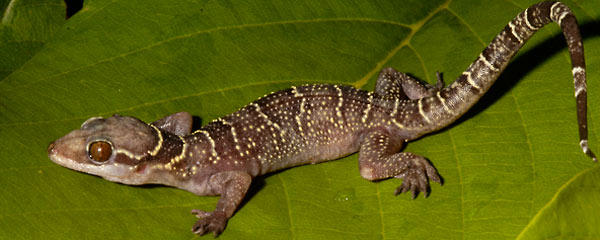We're open daily! View holiday hours
Science News
One Gecko Actually Four
June 2, 2010

UC Berkeley researchers have discovered that the West African forest gecko, a secretive but widely distributed species in forest patches from Ghana to Congo, is actually four distinct species that appear to have evolved over the past 100,000 years. They published their findings in this week's issue of the journal Proceedings of the Royal Society B.
The rainforest belt in West Africa stretches nearly 3,000 miles from the coast of Sierra Leone through the Guinean rainforest in Ghana, through Nigeria and Cameroon, to the Congolian rainforest. Over millions of years, the forest has expanded and shrunk with climate change and an aridification trend over the past several hundred thousand years.
The discovery by Adam D. Leaché, PhD, a herpetologist with UC Berkeley's Museum of Vertebrate Zoology, and Matthew K. Fujita demonstrates the wealth of biodiversity still surviving in the patches of tropical rainforest in West Africa, and the ability of new DNA analysis techniques to distinguish different species, even when they look alike.
Having collected numerous specimens of the six-inch gecko, the scientists decided to see whether studying the genetic diversity among the geckos could tell them something about the history of the rainforest belt.
“We tended to find this gecko, Hemidactylus fasciatus, throughout our travels in West Africa,” said Leaché. “Despite the fact that it is recognized as one species, using new methods we have established a high probability that it is composed of at least four species.”
Leaché and Fujita found sufficient genetic differences among the 50 geckos collected from 10 different forest patches to identify four distinct species. The different species were found in different forest patches, suggesting that the species divergence was driven by the isolation of gecko populations from one another after gaps developed in the rainforest.
“These rainforests are classified as one of the biodiversity hotspots on the planet, yet they are one of the most endangered areas on the earth,” Leaché said. “Human deforestation is accentuating the process of habitat destruction.” If our knowledge of the diversity of geckos expanded four-fold in these few patches, imagine what remains to be discovered in the rest of the rainforest belt in West Africa.